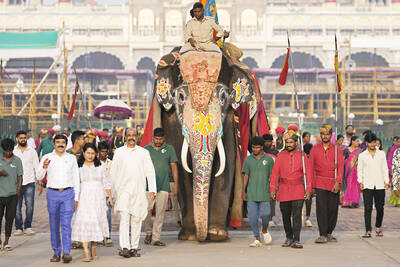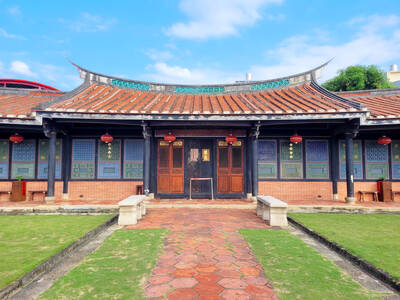Tsao Yan-hao (曹彥豪) and indie-electronica group KbN (凱比鳥) want to alleviate the stresses of everyday life.
Their artistic panacea is a collaborative exhibition that utilizes video projections of nightlife scenes from around the world.
“People go inside and listen to the music and dance on the dance floor,” Tsao said in a telephone interview.
The installation is one of roughly 20 on display as part of [Room19] Shake Your Mind!, a group exhibition at the Kuandu Museum of Fine Arts (台北藝術大學關渡美術館).
The exhibit’s theme is a response to Doris Lessing’s short story To Room Nineteen, a work about a woman who embarks on a journey of self-discovery after learning that her husband is having an affair. But whereas the story reflects on the dreariness of life, the exhibition is a celebration.
In Lessing’s melancholic musings on love, the hotel room is a symbol of oppression, but in [Room19] the nightclub is a space of freedom and individuality where people can express themselves without reservation.
Curated by Wu Dar-kuen (吳達坤), the exhibition brings together some of Taiwan’s finest contemporary musicians and visual artists, including Akibo Lee (李明道), New York-based Taiwanese photographer Daniel Lee (李小鏡) and expressionist Lee Ming-chung (李民中), in collaborations that have produced a variety of light, sound and image installations (often a combination of all three) that are designed to lift visitors out of their daily blahs.

A jumbo operation is moving 20 elephants across the breadth of India to the mammoth private zoo set up by the son of Asia’s richest man, adjoining a sprawling oil refinery. The elephants have been “freed from the exploitative logging industry,” according to the Vantara Animal Rescue Centre, run by Anant Ambani, son of the billionaire head of Reliance Industries Mukesh Ambani, a close ally of Prime Minister Narendra Modi. The sheer scale of the self-declared “world’s biggest wild animal rescue center” has raised eyebrows — including more than 50 bears, 160 tigers, 200 lions, 250 leopards and 900 crocodiles, according to

They were four years old, 15 or only seven months when they were sent to Auschwitz-Birkenau, Bergen-Belsen, Buchenwald and Ravensbruck. Some were born there. Somehow they survived, began their lives again and had children, grandchildren and even great grandchildren themselves. Now in the evening of their lives, some 40 survivors of the Nazi camps tell their story as the world marks the 80th anniversary of the liberation of Auschwitz-Birkenau, the most notorious of the death camps. In 15 countries, from Israel to Poland, Russia to Argentina, Canada to South Africa, they spoke of victory over absolute evil. Some spoke publicly for the first
Due to the Lunar New Year holiday, from Sunday, Jan. 26, through Sunday, Feb. 2, there will be no Features pages. The paper returns to its usual format on Monday, Feb. 3, when Features will also be resumed. Kung Hsi Fa Tsai!

When 17-year-old Lin Shih (林石) crossed the Taiwan Strait in 1746 with a group of settlers, he could hardly have known the magnitude of wealth and influence his family would later amass on the island, or that one day tourists would be walking through the home of his descendants in central Taiwan. He might also have been surprised to see the family home located in Wufeng District (霧峰) of Taichung, as Lin initially settled further north in what is now Dali District (大里). However, after the Qing executed him for his alleged participation in the Lin Shuang-Wen Rebellion (林爽文事件), his grandsons were